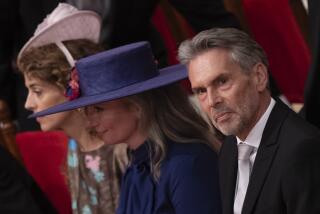Dutch Voters Reject EU Charter
- Share via
BRUSSELS — Dutch voters Wednesday dealt the proposed European constitution its second major blow in a week, fueling urgent debate in the European Union headquarters here about the future of an alliance that aspires to become a global power bloc.
About 61% of Dutch voters cast ballots against the constitution in a referendum, according to partial results Wednesday night. On Sunday, the French rejected the initiative, which would increase the power of EU institutions and streamline decision-making to integrate 10 new members in Eastern Europe. Like France, the Netherlands is one of the union’s six founders.
European officials and other analysts said voters’ rejection of the constitution could threaten the vision of Europe becoming a prosperous bloc, a United States of Europe that could compete with the U.S. and Asian powerhouses.
“There’s great danger that the whole European project will be stopped dead in the water,” said Dutch political scientist Maarten Van Rossem. “And if the whole thing is dead in water, in the medium term, [there is] danger of it going backward.”
Nine EU nations have approved the document, but it must be ratified by all 25 members to take effect.
The expected rejection by Dutch voters hit Brussels as top EU officials held heated discussions about how to deal with voters’ hostility toward the union. In Britain and newcomers Poland and the Czech Republic, ratification of the constitution faces such an uphill fight that leaders could respond to the French and Dutch results by simply calling off the process.
Some leaders favor junking most of the proposed charter and salvaging a few key measures by having them passed as more simple treaties, said a well-placed EU official, who requested anonymity.
Top officials of the executive branch here, the European Commission, are exasperated by commission President Jose Manuel Barroso’s insistence on continuing the lengthy ratification process in the 14 remaining countries, a well-placed EU official said.
“If we are intellectually honest, the ‘no’ vote would have more support than in the past in just about any country,” the official said. “There is an awareness here that we simply cannot go on like this. We have to listen to the message of the people and react rapidly.”
The issues driving Dutch opposition resembled those in France: a faltering economy, disenchantment with the government and angst over national identity.
The Dutch are anxious about losing sovereignty to the EU and jobs to low-wage countries in the east. Although the country’s 5% unemployment rate is half that of France, the Netherlands has endured four years of recession. Many Dutch resent that their country is the most generous per-capita contributor to the Brussels budget, particularly because it obeys EU-mandated caps on national deficit while bigger countries do not.
An assassination by accused Islamic extremists last year in Amsterdam exacerbated Dutch fears of crime, immigration and an application by Turkey, a predominantly Muslim country, to join the 25-member European Union. Those frustrations were not necessarily related to the referendum, but they influenced the vote, Van Rossem said.
“There is this idea that we are a small nation that would lose its security in a bigger Europe,” he said in a telephone interview. “The ‘no’ voters seem to be angry about a lot of things and they focus all that unfocused anger on the EU.”
The debate over Europe’s future pits leaders who favor free-market reforms to generate jobs against those who emphasize social programs to protect equality, analysts say.
France, Germany and Italy are nagged by stubborn unemployment, weak growth and big social welfare programs that are increasingly hard to sustain. But France in particular resists the “Anglo-Saxon” economic approach of Barroso and British Prime Minister Tony Blair, who favor deregulation and tightening government benefits to generate growth.
“In France, the implicit social policy has been preserving the rights of those who have a job rather than focusing on those who don’t have a job,” said Francois Heisbourg, a French political analyst.
The coming weeks promise intense debate. It may start at a summit here next month when 25 heads of European governments will discuss the proposed constitution and the adoption of the seven-year budget for the commission. Analysts say the summit could highlight how the influence of France and Germany, the longtime leaders of European integration, has faded steadily. Referring to a common refrain that the European Union, the world’s biggest exporter and internal market, is an economic giant and political dwarf, the EU official said, “We don’t want to be a political dwarf and an economic dwarf.”
The voter discontent in EU founding countries baffles some observers, who cite the alliance’s milestones: turning a once war-torn continent into an oasis of peace, dismantling internal borders, adopting the euro and stabilizing ex-Soviet bloc countries after the collapse of the Berlin Wall. Two Eastern European nations, Bulgaria and Romania, are on track to join the alliance in 2007.
Both sides in the Dutch debate exaggerated their claims, Van Rossem said. Proponents all but warned of new wars if the constitution failed, while opponents depicted an ominous, Brussels-based “super-state” on the march.
“It’s not a super-state,” he said. “It’s still a cooperative scheme of sovereign nations. But people believe in this mythical ogre of the EU bureaucracy.”
More to Read
Sign up for Essential California
The most important California stories and recommendations in your inbox every morning.
You may occasionally receive promotional content from the Los Angeles Times.













